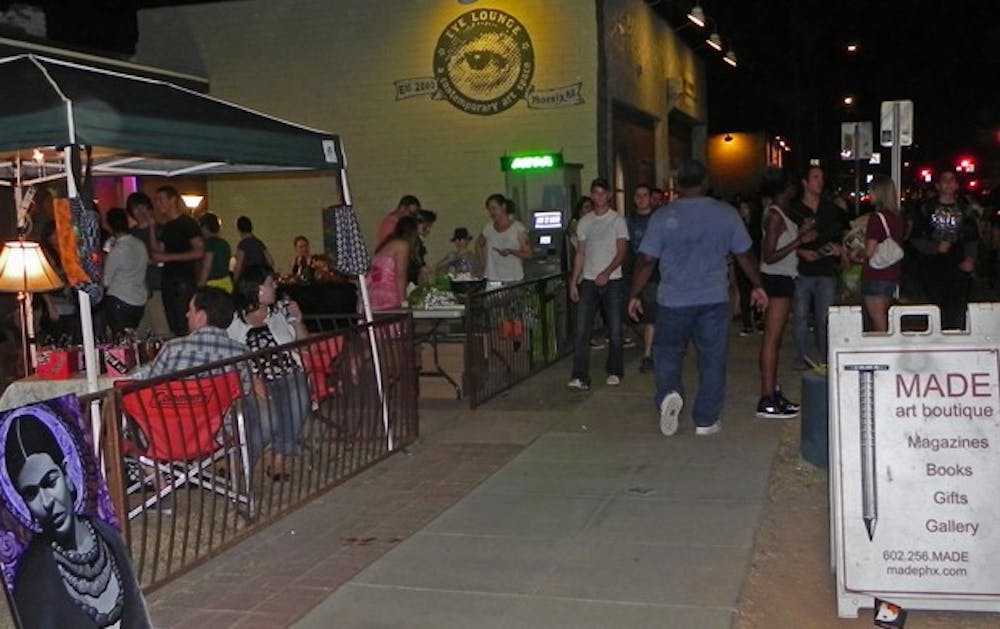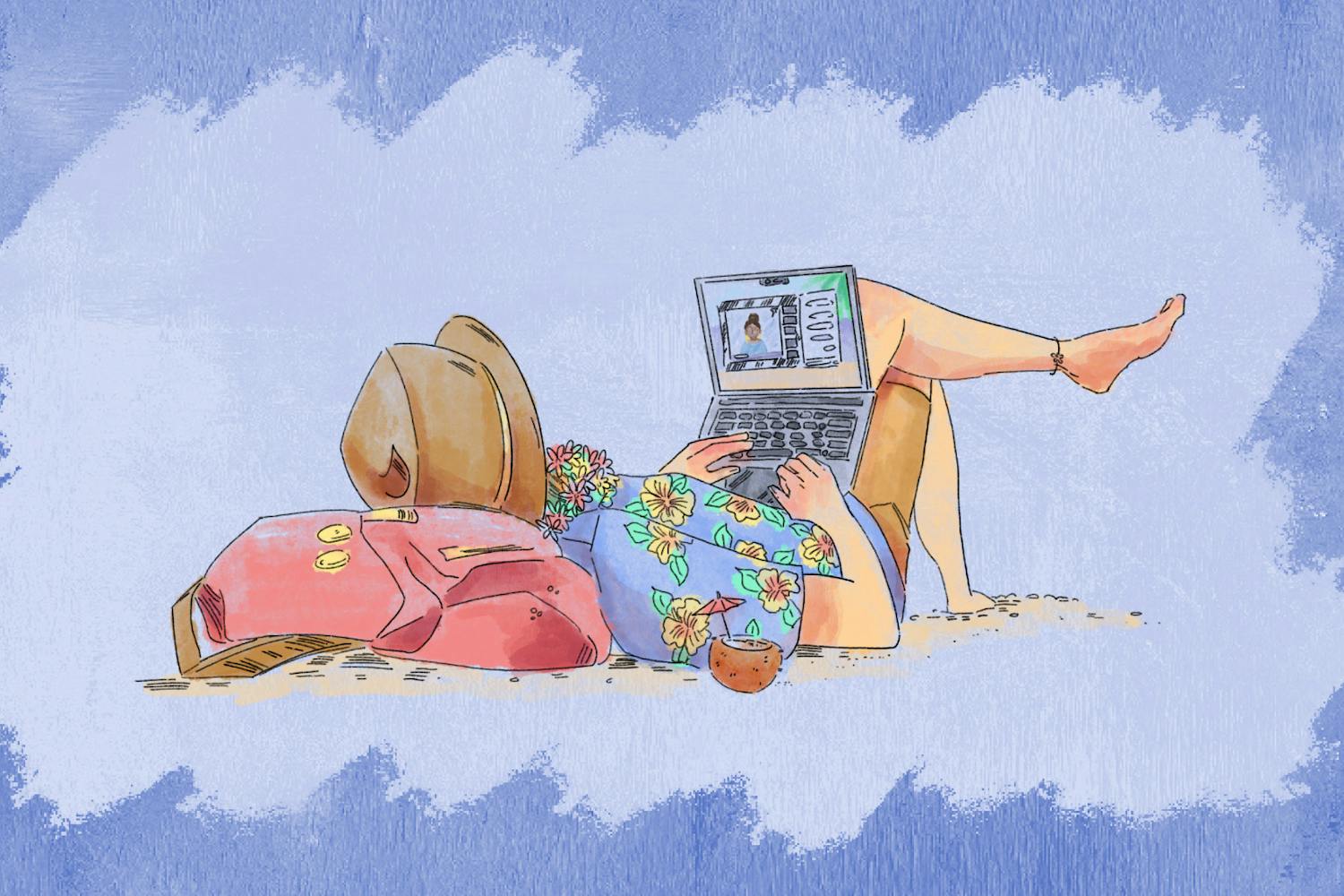First Fridays is an event that means many different things to many different people. Downtown Phoenix art galleries and museums open their doors to the public for free; restaurants and bars offer dinner and drink specials; businesses illuminate their stores and sidewalks are filled with tables and musicians, creating a community vibe unlike any other Phoenix has seen prior to 1994, when First Fridays began.
The sights, smells and experiences bring people back month after month, but recent changes to the event have shaken the First Fridays community.
Past
Artlink Phoenix, a non-profit arts organization in Phoenix, started First Fridays in 1994.
“[Then we were] definitely the only group encouraging people to get out of their cars, and walk around to experience our city... to check out and explore parts of our city — galleries and studios that they might not know existed,” says Sloane Burwell, president of Artlink.
In 2005, Roosevelt Row CDC, another Phoenix non-profit organization, saw the need for sidewalk vendors and artists to have a place to sell, so they created Phoestival (pronounced “festival”) and held the event every first Friday as well. The only legal way to hold street vendors, however, is to have an event permit, which requires a street closure.
Phoestival was originally on Garfield Street, but was moved to Roosevelt Street after city officials stepped in. Garfield was too small to contain the street festival and posed pedestrian safety issues.
Cindy Dach, a member of Roosevelt Row, co-owner of MADE art boutique and co-founder of eye lounge, says having Phoestival on Garfield Street was cost effective and even brought in some revenue, but moving it to Roosevelt changed the operation of the event.
“The city gave us two weeks notice and no one likes to be taken my surprise,” Dach says. “[Roosevelt] is a greater street to close and it costs more to divert the traffic.”
Non-art vendors had to be allowed to act as sponsors to pay for the event, which cost the organization $10,000 — twice as much as Garfield Street.
“We were able to keep artist fees to $50, but food vendors were paying $200 and [non-art vendors] paid $100,” Dach says.
It's important to remember while Artlink’s First Friday and Roosevelt Row's Phoestival overlap on the same street on the same night, they are not the same thing — the two forces join together, yet conflict at the same time.
“[Phoestival] definitely brought down greater numbers of people but [First Fridays] lost all of its charm because of it,” says John Sagasta, owner of Conspire on Fifth Street.
“Everyone goes bananas when someone sells [an art] piece for $3,000," he says. "Big sales like that can’t happen anymore because there are too many people and too many other things going on… they can’t appreciate it."
Dach says Roosevelt Row also felt pressure from the greater arts community — the artists, curators and gallery owners that wanted art to again be the main focus.
“I had people telling me, ‘This is a carnival,’” she says.
Present
Over the summer, Roosevelt Row decided to put Phoestival on hiatus. The group canceled it during July and August because of the scorching heat and took September off as well when plans to change locations fell through. Roosevelt Row wanted to move the event back to Garfield Street to cut costs, but city officials wouldn’t allow it.
The Downtown Artists Issues Task Force, which Artlink and Roosevelt Row are both a part of, met at city hall on Sept. 16 to discuss the future of Phoestival and potential solutions.
The meeting was filled with business owners, local artists and fire dancers, all concerned with the future of First Fridays. The discussion, however, did not focus on finding solutions. Instead of touching on agenda topics such as “potential performance/vending staging solutions” and “First Friday housekeeping: trash pickup, security, restrooms," a majority of the meeting was dedicated to clearing up vending and performance laws with city officials.
“If you want to vend in Central Phoenix, your options are extremely limited,” says Burwell of Artlink. “You can participate in the lottery to sell water and hotdogs by the stadiums downtown, or you can have a cart where you are forced to move 1,500 feet every hour. There’s no current permit to allow the kind of vending that grew naturally out of First Fridays."
Without a street closure and event permit, the only other way to have vendors on private property is to have what is essentially a garage sale.
“I’m allowed by law [to have vendors on my property] as long as I regularly sell their merchandise in my store and the sales go through me,” says Dach of MADE.
This loophole, however, does not help the artists who would sign up independently to be a part of Phoestival. By greatly decreasing the amount of vendors, businesses suffer as well.
T.J. Jordan of Revolver Records says his store relies on vendors because they attract crowds to his business. In September, Revolver had live bands and 15 local artists on its property.
“[September] was our biggest First Friday we’ve ever had... and that’s because vendors bring money to downtown,” Jordan says.
Revolver was the only business on Roosevelt Street with vendors that month, but the store's event permit turned out to be the wrong kind. When Jordan inquired about the correct permit, a city inspector didn’t have a solution.
“I told the inspector it’s like pulling me over for speeding but you don’t know the speed limit,” he says.
Revolver was allowed to proceed, but they weren’t as lucky in October. Tables and tents filled Revolver’s property on Oct. 1, but while artists were still setting up, they were told to pack up by city officials.
Revolver had the wrong permit yet again and its landlord was issued a citation by the city. The 20 artists on the property were not.
Jordan worries the artists who have relied on selling their handmade art during the first Friday of every month are not being considered in the fight for First Fridays.
“[In September] artists came up to me and told me, ‘Thank you,’ because they haven’t been able to make their rent [without First Fridays],” he says. “My main issue is that I want the event to go on for the tons of artists in Phoenix.”
Future
At this point in time, Roosevelt Row does not plan to continue Phoestival, but Dach says they will continue to work to find a solution.
Ruth Osuna, director of cultural affairs for the Phoenix Office of Arts and Culture, says people still go to Roosevelt Street expecting Phoestival's vendors.
“[Roosevelt Row] created an event and it grew, which is a great thing, but it grew beyond what the organization was capable in managing in terms of staffing and money,” Osuna says.
Osuna says there is a “generation gap” between those in charge of First Friday and those attending.
"We don’t want to discourage people from art at a young age because you want them to come back, but they aren’t buying the art," she says. "It’s the 50-something-year-olds that do."
Both Phoestival and Artlink also saw a disconnect between patrons and vendors.
“Artlink brings the galleries together. The restaurants are looking for the patrons off those art galleries as well as some
of the retail, but the disconnect is that the original patrons Artlink was appealing to are different from the ones Phoestival was appealing to,” Osuna says.
Nisha Patel, a global studies environment junior at Arizona State University, says she wouldn’t attend First Fridays if local street vendors weren’t involved.
“I look forward to seeing local artist on the sidewalks because it’s different from the art in the galleries," Patel says. "A stroll through the art walk lets you see a different side of Phoenix — the creative side."
Patel walked through Roosevelt Street on Oct. 1 but noticed it was vastly different from her previous First Friday visit in the spring.
"Vendors use to be spread out all over but now they're few and far between," she says.
Sagasta of Conspire believes something positive can come from the hiatus of a street fair; visitors can now explore other neighborhoods celebrating First Fridays, like Grand Avenue.
“People are staying confined to the [Roosevelt] area because they don’t know [downtown Phoenix] that well,” he says. “The street closure didn’t allow for much foot traffic.”
Burwell agrees.
“Keeping people in one area kept people from exploring all of the parts that are open and accessible and happening during First Fridays, like Grand Avenue, like parts of the warehouse district, like the IceHouse," she says.
The First Fridays community is still divided on what they want to see happen, and plans are changing monthly. It remains to be seen what will be available to November and December's First Friday holiday shoppers.
Revolver Records is currently looking into possibly closing Second Street with the help of a sponsor and promises to have vendors in November. Ultimately, Jordan believes First Friday will continue to repeat its history, changing location with each city intervention and arts organization feud.
“First Fridays is not going back to how it was — it’s going to evolve,” Jordan says.
Contact the reporter at apanguia@asu.edu.







